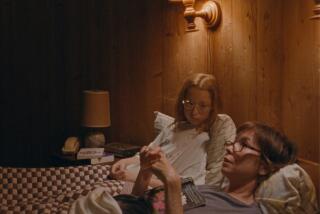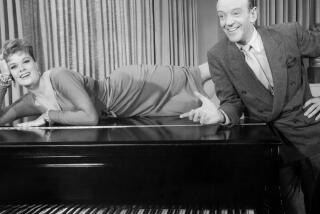Review: ‘Janis: Little Girl Blue’ reveals what drove, and haunted, Janis Joplin
It’s hard to imagine in the age of Taylor, Miley and Rihanna, where airbrushed looks are paramount and rebellion is curated, that an artist like Janis Joplin was ever allowed to happen.
Imperfect and messy, she was a white girl who sang the blues, a wily independent figure who predated equal rights, an artist brave enough to lay herself bare in song then pay the ultimate price for that fearlessness.
Joplin’s name alone now serves as shorthand for a countercultural music revolution. But unlike her equally revered peers such as Dylan and Hendrix, whose life stories have been milked incessantly by filmmakers, biographers, rock historians and T-shirt franchises, there’s mystery as to who the woman behind that voice really was.
SIGN UP for the free Indie Focus movies newsletter >>
“Janis: Little Girl Blue,” out in limited release Friday, is the rare documentary that focuses solely on the life of the late singer as opposed to the role she played in making the Summer of Love, the Haight-Ashbury scene or Woodstock a precious memory for boomers.
Oscar-nominated director Amy Berg (“Deliver Us From Evil”) paints an intimate portrait of a woman shaped by her early years as a bullied outcast in Port Arthur, Texas. Though later celebrated for her inability to be like the other girls, Joplin never entirely overcame that early rejection, and her need for acceptance is a central theme throughout “Little Girl Blue.”
As the documentary shows, Joplin fought relentlessly to be herself — a rowdy and adventurous woman who literally belted out her rage, sorrow and happiness on a world stage while simultaneously asking the world to do what her classmates, parents and neighbors never could: love her for who she was.
For a loud-mouthed, opinionated girl with unpolished looks and unbridled sexuality, it was a big ask, especially in the post-1950s America. “A desperate mating call,” was how one reviewer, flummoxed by her like much of mainstream America, described Joplin’s guttural voice.
Joplin’s siblings, former bandmates, lovers (men and women) and personalities such as music mogul Clive Davis and ‘60s talk-show host Dick Cavett are interviewed, their memories and insights on the late singer woven together with rarely seen footage, family photos (Janis in a Bluebird uniform, in choir, as an awkward high school senior) and more familiar moments from Woodstock and the Monterey Pop Festival.
From this pastiche Joplin emerges as we’ve never seen her before, articulate, ambitious, torn between her wild self and her desperate need for stability.
But the closest we get to her are in letters she wrote to her family from the time she left Port Arthur for San Francisco in the early ‘60s until her death in Los Angeles in 1970 at age 27.
Indie folk singer/songwriter Chan Marshall (a.k.a. Cat Power) narrates the letters, which have never before been released to the public. When writing to her parents about why music mattered to her above college, marriage and everything else they’d hoped for their daughter, she mentions Aretha Franklin and Billie Holiday. In just two notes, she said, they could “make you feel like they told you the whole universe.”
Familiar footage of Joplin performing at Monterey and Woodstock feels fresh given all the personal context the film provides leading to those breakthrough moments in her career. The reaction of audiences, who were floored and almost blindsided by the sheer passion of Joplin, illustrates what a true anomaly she was in a rock world populated almost entirely of men. Joplin didn’t wave the flag of feminism, she embodied it.
Unpolished even in terms of the era, Joplin broke ground for every female rock and pop performer in her wake and did it in the course of an absurdly short career. But this was before the age of pop celebrity media training and politically correct responses. When asked by an interviewer why there weren’t more women like her in music, she answered, “You are what you settle for. If they settle for being someone’s dishwasher, that’s her own … problem.”
As “Little Girl Blue” attests, the intensity and raw emotion that made Joplin a great artist also made her life a chaotic, unhappy and lonely affair.
She numbed that pain with short-lived relationships, a drinking habit formed in high school and, later, drugs that were the lifeblood of 1960s San Francisco. Her growing heroin habit is documented in the film via first-hand accounts of those closest to Joplin (her bandmates from Big Brother and the Holding Company, her friend Bob Weir of the Grateful Dead), and their stories of her demise are wrenching.
But the deepest insight as to why Joplin imploded comes from the singer herself.
“I managed to pass my 27th birthday without really feeling it,” she wrote in a letter home months before her death. “It’s such a funny game. Two years ago, I didn’t even want to be ‘it.’ No, that’s not true. I’ve been looking around, and I’ve noticed something. After you reach a certain level of talent … the deciding factor is ambition. Or as I see it, how much you really need to be loved....”
Follow @LorraineAli on Twitter
------------
‘Janis: Little Girl Blue’
MPAA rating: None.
Running time: 1 hour, 45 minutes.
Playing: Arclight Hollywood, Laemmle Royal, West L.A.; Laemmle Playhouse 7, Pasadena
More to Read
Only good movies
Get the Indie Focus newsletter, Mark Olsen's weekly guide to the world of cinema.
You may occasionally receive promotional content from the Los Angeles Times.











